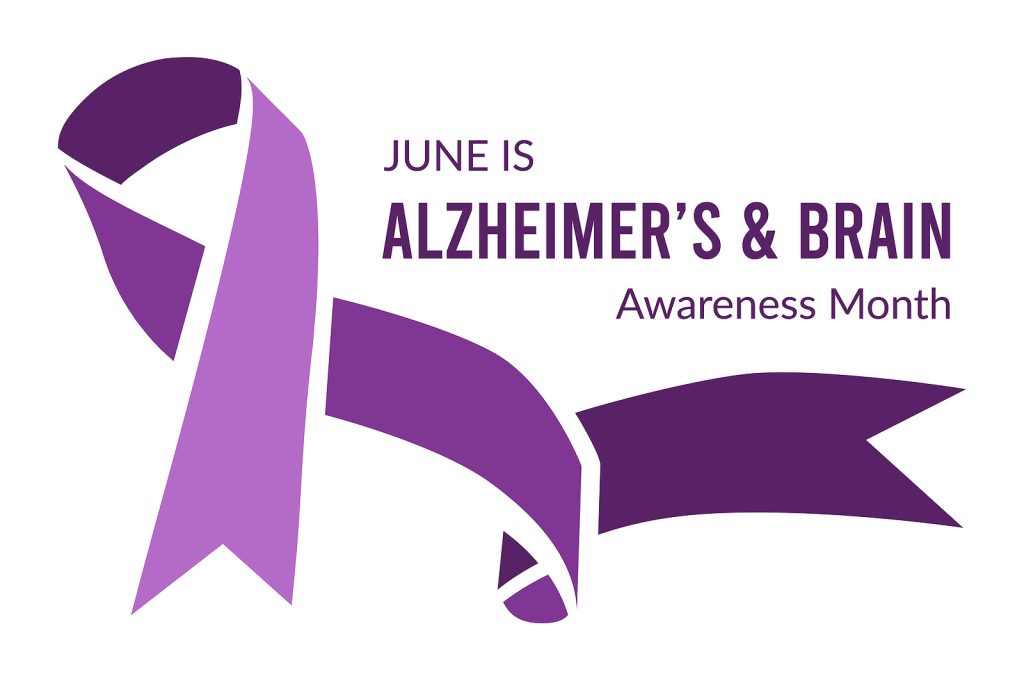

Alzheimer’s and Brain awareness month is a crucial time to educate people about the importance of brain health and familiarize them with the signs and symptoms of Alzheimer’s Disease. Worldwide, over 55 million people are living with Alzheimer’s or other forms of dementia.
Alzheimer’s disease is a progressive neurodegenerative disorder that primarily affects memory, thinking skills, and behavior. The early signs and symptoms of Alzheimer’s can vary from person to person, but common indicators include:
1. Memory Loss: Forgetfulness that disrupts daily life, such as forgetting recently learned information, important dates or events, or repeatedly asking for the same information.
2. Difficulty with Planning and Problem-Solving: Challenges in making plans, following through with tasks, or solving problems, such as managing finances or following a recipe.
3. Confusion with Time or Place: Losing track of dates, seasons, or the passage of time. Getting lost in familiar places or having trouble understanding where they are and how they got there.
4. Difficulty Completing Familiar Tasks: Struggling to complete routine tasks that were previously easy, such as driving to a familiar location, managing household chores, or remembering the rules of a favorite game.
5. Changes in Vision and Spatial Relationships: Difficulty reading, judging distances, or determining color or contrast, leading to problems with driving or navigating stairs.
6. Trouble with Words and Conversations: Difficulty finding the right words, following or joining conversations, or repeating themselves. They may struggle to follow a storyline or engage in social interactions.
7. Misplacing Items and Losing the Ability to Retrace Steps: Putting things in unusual places and being unable to retrace steps to find them. Accusing others of stealing or moving items.
8. Decreased Judgment or Poor Decision-Making: Making poor decisions with money, hygiene, or personal safety. They may also exhibit changes in judgment or social behavior, such as increased impulsivity or decreased interest in hobbies or activities.
9. Withdrawal from Work or Social Activities: Losing interest in previously enjoyed activities, hobbies, or social gatherings. Withdrawing from work or social events due to difficulties with memory or cognitive function.
10. Mood and Personality Changes: Changes in mood, personality, or behavior, such as increased irritability, anxiety, depression, or mood swings.
It’s important to note that experiencing one or more of these symptoms does not necessarily mean a person has Alzheimer’s disease. However, if these symptoms interfere with daily life or persist over time, it’s essential to seek medical evaluation and guidance from a healthcare professional for an accurate diagnosis and appropriate management. Early detection and intervention can help individuals and their families better manage symptoms and plan for the future.
Maintaining brain health is crucial for overall well-being and cognitive function. Here are ten healthy habits that can help promote brain health:
1. Regular Exercise: Physical activity increases blood flow to the brain and promotes the growth of new brain cells, enhancing cognitive function and reducing the risk of cognitive decline.
2. Healthy Diet: Consuming a balanced diet rich in fruits, vegetables, whole grains, lean proteins, and healthy fats provides essential nutrients and antioxidants that support brain health.
3. Adequate Sleep: Quality sleep is essential for brain health, as it allows the brain to rest, repair, and consolidate memories. Aim for 7-9 hours of sleep per night.
4. Stress Management: Chronic stress can negatively impact brain health. Practice stress-reduction techniques such as meditation, deep breathing exercises, or yoga to promote relaxation and mental well-being.
5. Mental Stimulation: Engage in activities that challenge your brain, such as puzzles, games, learning a new skill or language, or engaging in creative hobbies. Continuous mental stimulation helps maintain cognitive function and may reduce the risk of cognitive decline.
6. Social Connections: Maintaining social connections and engaging in meaningful social activities can support brain health and reduce the risk of cognitive decline. Spend time with friends and family, join clubs or groups, or volunteer in your community.
7. Limit Alcohol Consumption: Excessive alcohol consumption can impair cognitive function and increase the risk of cognitive decline. Limit alcohol intake to moderate levels or avoid it altogether.
8. Quit Smoking: Smoking is associated with a higher risk of cognitive decline and dementia. Quitting smoking can improve overall health and reduce the risk of brain-related disorders.
9. Stay Hydrated: Adequate hydration is essential for brain function. Drink plenty of water throughout the day to maintain cognitive performance and overall health.
10. Regular Health Check-ups: Regular medical check-ups can help identify and manage risk factors for brain-related disorders such as hypertension, diabetes, and high cholesterol. Work with your healthcare provider to monitor and maintain overall health.
Incorporating these habits into your lifestyle can help promote brain health and support cognitive function throughout life.
The Alzheimer’s Association is a wonderful resource for issues relating to brain health. Their website is www.alz.org.
